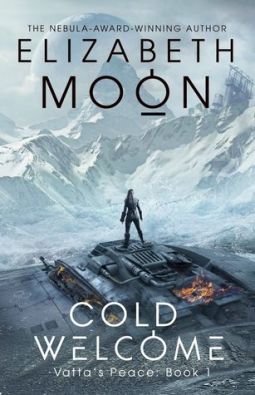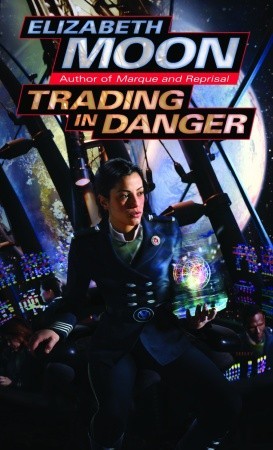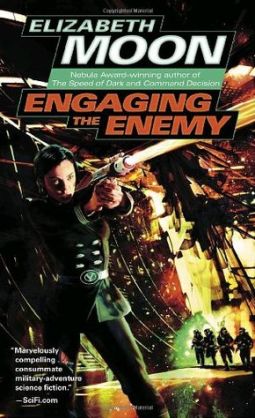Worldbuilding a “Star Punk” Future #2: Post-Certainty Society in Elizabeth Moon’s Vatta’s Peace

Go on a Traveller RPG forum and ask for book recommendations, and somebody will suggest Elizabeth Moon’s Vatta’s War series — a series that has just spawned a rather good sequel, Vatta’s Peace.
The Vatta books are, of course, a really good read. They’re gritty and realistic — it helps that Moon’s ex-military. They’re also fast-paced and well-written, they have vivid characters you enjoy hanging out with, and a strong female protagonist (or two). The same can be said of her other big SF series, affectionately known among my friends as “Scary Horse Aunts In Space” (*) but it’s the Vatta books that come up because they feel a lot like Traveller, meaning they fit my definition of Star Punk:
Set in [a] spacefaring civilization… where… technology has somehow failed to eliminate the human element, where you still need a human to pull the trigger or pilot the scout ship, and where nanotechnology, 3D-printing and vertical farms have neither eliminated trade, nor ushered in a crime-free post scarcity society. They all involve individuals or companions — adventurers, traders, investigators, contractors — pursuing goals of only local significance. (*)
Except for not being an ensemble piece, the series really could be a superior Traveller campaign! It even kicks off with Ky operating as a free trader having left Naval Academy due to a scandal — did somebody fail her survival roll during character generation? It expands to encompass family corporations, commercial espionage, romance, family drama, conspiracy, politics, atrocity, piracy and ultimately set-piece space battles.
However, it rarely loses sight of the business of space travel. Our intrepid hero must deal with crew, repairs, finance, quirky local custom, in addition to the issues around using a civilian ship in armed conflict against pirates and other enemies… this is like a story from the 1970s, but with a tighter plot, modern diversity and values, and much better writing.
The setting — the worldbuilding — is also very Traveller-like in that the technology is limited in such a manner as to create a near-future-but in spaaace feel. Moon achieves this mostly by deploying the third of the options identified in the my last article: she turns the technology against itself.

In the Vattaverse, for any given level of resources, technological attack is stronger than technological defence. Any automated system can be spoofed or hacked.
Thus in Vatta’s Peace:
Even the best home security can be compromised. The telltale is not your automated warning system, but that your stuff has been disturbed.
No matter how good your network security, somebody with equal skill and technology who is focused on the task can hack it. You’ll only know you’ve been hacked if you spot the bad things that happened, e.g. your server farm just caught fire, or your surveillance system isn’t… surveilling.
You can’t rely on DNA and biometrics to establish personal identity because temporary DNA squirts and prosthetics can fool your systems. It takes human intuition to recognise the old friend in the hi-tech fat suit.
There are no exotic wibble-ray scanners, so it’s still hard to find things. People can still smuggle contraband inside other objects, enemy combatants can still hide behind rocks — fire and manoeuvre still works! — and atmospheric conditions can still hide entire vessels.
There are lots of hi-tech ways to travel, communicate and search, but planets are still very big and bad weather can be a showstopper. You can’t, to take an entirely random example, just drop out of the sky to rescue somebody from arctic waters during a storm.
The result is not so much a post-truth society as a post-certainty universe.
Sure, you can try to buy certainty… certainty of security or knowledge… through purchasing technology or expertise. However, there’s no natural cut-off point.
Perhaps if you spend a little more of your resources, dig just a little deeper, you’ll pierce the veil of the illusion that’s been silently smothering you? Or gain that little bit more security?

Or perhaps not.
When you buy certainty, how certain are you that you trust the vendor?
And trust is important because in a post-certainty universe, nothing stays nailed down unless a human actively attends to the nailing.
It takes a human with knowledge of context and norms to notice something’s not quite right about a transaction or a pattern of transactions, or that a street scene or a space station seem off key. It also takes a human to resist routine hacking and spoofing.
It follows that this is a universe where contract culture and zero hours contracts are a really bad idea.
We moderns increasingly rely on the apparatus of the law to ensure trust, but that requires a reasonable possibility of catching somebody in the act, and proving that you did so. In contrast, Moon’s post-certainty universe has no truly reliable forensic or surveillance technologies. Its players must base their trust on personal loyalty and long association.
Just as in the Late Middle Ages, post-certainty society must be built of quasi-feudal great “houses”, themselves woven from family members and retainers. You can’t prevent people from betraying you, but you can pick or nurture people who will have good reasons not to want to: because they feel a reciprocal loyalty to you and yours, and because they have a long-term interest in your success.
Nepotism and cronyism are prerequisites for survival. The best bodyguard is your cousin’s college friend, the most reliable captain for your ship is your nephew, the best PA is one you’ve known since he signed on as an office junior twenty years ago.
So it is that, despite the rivets and assault rifles vibe, conflict in the Vattaverse hinges on humans using the most basic of human faculties — empathy, intuition, and charisma, and common sense and instinct — which is one reason why the Vatta series is so very compelling.
It’s illuminating to contemplate the currency of that conflict, which is Time.
The uber hacker and the black ops infiltration team can pretty much do any task, but they can only one task at a time. The challenge for their opposition is identifying that task, deducing its significance, and in turn allocating time to respond. As such, the Vatta series is a masterclass for both writers and referees of far future adventure. Go read it from the beginning, and show it some love in your Amazon reviews!
M Harold Page is the Scottish author of The Wreck of the Marissa (Book 1 of the Eternal Dome of the Unknowable Series), an old-school space adventure yarn about a retired mercenary-turned-archaeologist dealing with “local difficulties” as he pursues his quest across the galaxy. His other titles include Swords vs Tanks (Charles Stross: “Holy ****!”) and Storyteller Tools: Outline from vision to finished novel without losing the magic. (Ken MacLeod: “…very useful in getting from ideas etc to plot and story.” Hannu Rajaniemi: “…find myself to coming back to [this] book in the early stages.”)